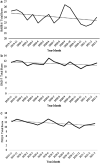Effects of COVID-19 on Patients in Adult Ambulatory Psychiatry: Using Patient-Rated Outcome Measures and Telemedicine
- PMID: 35167369
- PMCID: PMC9587767
- DOI: 10.1089/tmj.2021.0642
Effects of COVID-19 on Patients in Adult Ambulatory Psychiatry: Using Patient-Rated Outcome Measures and Telemedicine
Abstract
Introduction: To examine the effects of coronavirus disease 2019 (COVID-19) on patients in an academic psychiatric ambulatory clinic, data from a measurement-based care (MBC) system were analyzed to evaluate impacts on psychiatric functioning in patients using telemedicine. Psychiatric functioning was evaluated for psychological distress (brief adjustment scale [BASE]-6), depression (patient health questionnaire [PHQ]-9), and anxiety (generalized anxiety disorder [GAD]-7), including initial alcohol (U.S. alcohol use disorders identification test) and substance use (drug abuse screening test-10) screening. Methods: This observational study included MBC data collected from November 2019 to March 2021. Patient-Reported Outcome Measures (PROMs) were examined to determine changes in symptomatology over the course of treatment, as well as symptom changes resulting from the pandemic. Patients were included in analyses if they completed at least one PROM in the MBC system. Results: A total of 2,145 patients actively participated in the MBC system completing at least one PROM, with engagement ranging from 35.07% to 83.50% depending on demographic factors, where completion rates were significantly different for age, payor status, and diagnostic group. Average baseline scores for new patients varied for the GAD-7, PHQ-9, and BASE-6. Within-person improvements in mental health before and after the pandemic were statistically significant for anxiety, depression, and psychological adjustment. Discussion: MBC is a helpful tool in determining treatment progress for patients engaging in telemedicine. This study showed that patients who engaged in psychiatric services incorporating PROMs had improvements in mental health during the COVID-19 pandemic. Additional research is needed exploring whether PROMs might serve as a protective or facilitative factor for those with mental illness during a crisis when in-person visits are not possible.
Keywords: COVID; behavioral health; e-Health; telemedicine; telepsychiatry.
Conflict of interest statement
The authors declare that this represents original work, that we have the rights to this work, and that this work is not being considered for publication elsewhere and has not been published elsewhere. In addition, we have obtained and can supply all necessary permissions for the reproduction of any copyright works that are not owned by us. The authors declare that there is no conflict of interest.
Figures

Similar articles
-
Assessing the impact of COVID-19 on outpatient psychiatric population well-being and symptomology utilizing COVID-19 Events Checklist (CEC) and Measurement Based Care.J Patient Rep Outcomes. 2024 Nov 21;8(1):135. doi: 10.1186/s41687-024-00802-z. J Patient Rep Outcomes. 2024. PMID: 39570497 Free PMC article.
-
Psychological distress in the face of a pandemic: An observational study characterizing the impact of COVID-19 on immigrant outpatient mental health.Psychiatry Res. 2021 Jan;295:113595. doi: 10.1016/j.psychres.2020.113595. Epub 2020 Dec 2. Psychiatry Res. 2021. PMID: 33296817 Free PMC article.
-
Comparison of Delivery of Care Before and During COVID-19 Within an Academic Outpatient Psychiatry Practice.Telemed J E Health. 2023 Dec;29(12):1801-1809. doi: 10.1089/tmj.2023.0020. Epub 2023 Apr 17. Telemed J E Health. 2023. PMID: 37074079
-
COVID-19 and telepsychiatry: Early outpatient experiences and implications for the future.Gen Hosp Psychiatry. 2020 Sep-Oct;66:89-95. doi: 10.1016/j.genhosppsych.2020.07.002. Epub 2020 Jul 9. Gen Hosp Psychiatry. 2020. PMID: 32750604 Free PMC article. Review.
-
Telephone interventions for symptom management in adults with cancer.Cochrane Database Syst Rev. 2020 Jun 2;6(6):CD007568. doi: 10.1002/14651858.CD007568.pub2. Cochrane Database Syst Rev. 2020. PMID: 32483832 Free PMC article.
Cited by
-
Use of Patient-Reported Outcome Measures to Assess the Effectiveness of Hybrid Psychiatric Visits.Psychiatr Serv. 2024 Dec 1;75(12):1206-1212. doi: 10.1176/appi.ps.20230355. Epub 2024 Jun 12. Psychiatr Serv. 2024. PMID: 38863328 Clinical Trial.
-
Effectiveness of telehealth versus in-person care during the COVID-19 pandemic: a systematic review.NPJ Digit Med. 2024 Jun 15;7(1):157. doi: 10.1038/s41746-024-01152-2. NPJ Digit Med. 2024. PMID: 38879682 Free PMC article. Review.
-
An EPIC transition: Rapid conversion of a measurement feedback system in behavioral health.Digit Health. 2025 Aug 6;11:20552076251359133. doi: 10.1177/20552076251359133. eCollection 2025 Jan-Dec. Digit Health. 2025. PMID: 40777835 Free PMC article.
-
Assessing the impact of COVID-19 on outpatient psychiatric population well-being and symptomology utilizing COVID-19 Events Checklist (CEC) and Measurement Based Care.J Patient Rep Outcomes. 2024 Nov 21;8(1):135. doi: 10.1186/s41687-024-00802-z. J Patient Rep Outcomes. 2024. PMID: 39570497 Free PMC article.
-
Patients with affective disorders profit most from telemedical treatment: Evidence from a naturalistic patient cohort during the COVID-19 pandemic.Front Psychiatry. 2022 Dec 1;13:971896. doi: 10.3389/fpsyt.2022.971896. eCollection 2022. Front Psychiatry. 2022. PMID: 36532188 Free PMC article.
References
-
- World Health Organization. WHO Director-General's opening remarks at the media briefing on COVID-19-11, March 2020. Available at https://www.who.int/dg/speeches/detail/who-director-general-s-opening-re... (last accessed December 5, 2020).
Publication types
MeSH terms
Grants and funding
LinkOut - more resources
Full Text Sources
Medical
